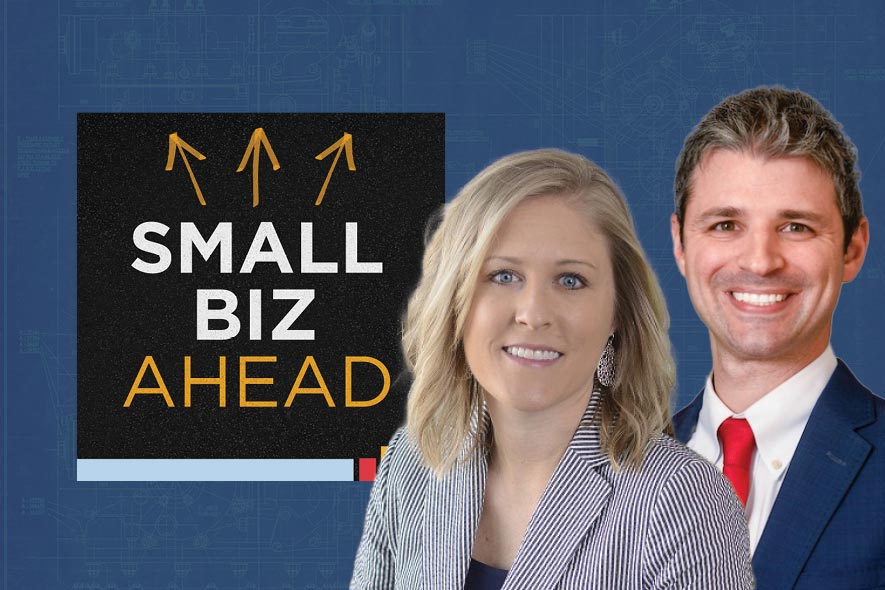It’s hard to find and then hire reliable employees–especially if you work in an industry like construction. On today’s podcast, Gene Marks and Elizabeth Larkin discuss how to attract and retain good laborers. They also give advice on whether it’s ever a good idea to hire a family member (spoiler alert: no, but there are exceptions!).
Listen now to the Small Biz Ahead Podcast.
Welcome to another episode of the Small Biz Ahead Podcast. Sign up for the weekly newsletter so you never miss an episode.
Links
- Never on Time: How to Handle a Perpetually Late Employee
- Always Out: What To Do When An Employee Keeps Calling In Sick
- UpWork
QUESTION #1: Hiring Laborers
Elizabeth: Okay, question one. This is a toughie and it’s from someone from Connecticut.
Gene: Someone from Connecticut.
Elizabeth: Which I’m very excited about. This is from Hugh in Connecticut.
Gene: Okay.
Elizabeth: “I run a contracting business and have become very successful on my own. I’ve been running this business for about six years now. I do home renovation such as finishing basements, redoing kitchens and building decks. But I’ve also moved into government contract jobs such as helping to build highways with a backhoe that I own. My problem is that I only have one employee. It’s taken me several years to train him and now he’s starting to work for other contractors. I can’t expand my business if I’m not able to hire other people. In my line of work it’s difficult for me to find competent workers and who are mature enough to stick with me for their entire career. It’s also usually easier for me to just do the job myself. I’m sure that sounds very familiar to a lot of business owners. Instead of hiring a novice worker, it’s easier for me to do the job on my own because I’m able to work eight times faster. Do I need to hire new employees to expand my business and if so, how?”
Elizabeth: There’s a lot to unpack in this question. I feel like this is a real conundrum and a great question. We haven’t really touched on this before.
Gene: Yes.
Elizabeth: From my perspective I’m wondering why it’s hard to find good employees. Are you saying that they’re bad because … typical like they’re not showing up on time, they’re calling out sick, they’re just not dong a good job?
Gene: First of all, I’d say something. When I travel around the country and I talk to business owners and people in the small business community and mid size market companies, I think the number one problem in many states is …
Elizabeth: Hiring people.
Gene: Yes, it’s finding people, skilled workers, it’s an issues. It’s a big issue. The issue that he’s facing does not surprise me.
Elizabeth: It’s huge. The other thing I’m wondering are they just bad workers or do they just not have the skills so he has to take so much time out of his time to train them? Then he trains them and then they leave. I feel like in an industry like construction you’re not going to hire a full-time employee because you don’t have steady business, I’m assuming.
Gene: The answers actually easier than you think. The answer is … It’s Hugh from Connecticut?
Elizabeth: Yes.
Gene: Hugh has got to look himself in the mirror and decide what kind of a business owner or manager he is. Hugh are you a technical person? Are you the contractor person? Or are you a salesperson? Because in the end that’s going to determine how you’re going to grow your business.
My business, just to let you know, I have ten people in my company. Back in the day, this was like 15 years ago, it was just me and my dad. My dad was selling the work and I was doing the work. Ultimately, my dad unfortunately passed away, so it was just me doing the work. Because I was doing the work and more work was coming in, just through referrals, just sort of natural whatever, I made the decision to hire somebody to do the work for me. It was a tough decision to make because when you’re a contractor like Hugh is you have relationship with your customers and your clients so people want him. “I want Hugh at my job. I hired you, Hugh. I didn’t hire this bozo that you’re hiring [inaudible 00:08:25] whatever. I want you.”
So that’s tough. That is tough. I got that same response from my clients when I said, “I’ve got Cory now who’s going to be working with … He’s going to be servicing you. He’s going to…” They were like, “Well, I don’t …” That was tough. But what it did is this; Hugh, your asset, your inventory in your business is your people, right? The more people that you have working for you, the more incentive that you have to keep them busy. So, this gets back to the original thing I asked you to look at yourself. If you’re a salesperson, then your job will not be contracting anymore, it will not be going out to customers and doing estimates. It will not be hammering nails into walls.
Elizabeth: Using the backhoe.
Gene: Your job will be selling new jobs. That’s now your job. Your job will be keeping those people busy all the time. One thing I want to say, Elizabeth, is that I didn’t really start to make money at my business until I started to hiring people.
Elizabeth: Really?
Gene: There’s only 40 hours in a week and I’m charging $150 an hour. I’m not saying I was busy for all those 40 hours because there’s other stuff that gets in the way. She could do the math, you make a living that way, that’s fine.
But now, think about it this way, now I’ve ten people in my company and we bill out at $150 an hour and each of these people are doing anywhere from 30 to 50 hours per week. You could do the math there. A lot more money than if it’s just you doing it yourself. If you want to grow your business, yes, there’s risks. Welcome to world of owning your own business. If you’re a salesperson because you’ve got a great technical background, he knows what he’s doing. He should be able to sell his services better than I could sell his services. He can make a lot more money.
You can, Hugh, if you devote yourself to just bringing in work and have the self confidence to hand that work off to other people to do it for you. I promise you there is going to be heartache. Some customers are going to be unhappy because of it. There are going to be screw ups. That happens to me all the time. Screw up on jobs, whatever. The whole goal is for you to minimize them. It will be a cost to your business but hopefully the work that your bringing in will supersede what those costs are.
Elizabeth: I feel like, also, just getting government contracts that takes a huge amount of time.
Gene: Sure.
Elizabeth: That’s a ton of work.
Gene: Yes.
Elizabeth: It’s really hard to get the government contract and then also execute it yourself.
Gene: Of course, it’s a full time job applying for more contracts, then doing the paper work and the reporting. We talked about this in an earlier podcast about outsourcing payroll. The smartest business owners I know, they focus on growing their business. In the end, everybody talks about growing, growing, growing their business. They’re selling, okay. They focus on sales. I mean that’s what they do. They’re sales and marketing people. When jobs come in like a government job or a government bid, they’ve got a guy, when I say guy I mean a guy or a woman, whatever, they’ve got somebody.
Elizabeth: Yes.
Gene: He’s going to do that process for them. They’re not going to sit there, spend all night filling out the forms. They’re out there looking for more work. If Hugh’s got a couple of people working for him that’s on his payroll, trust me, Hugh has got all the incentive in the world now to be running around looking for work.
Elizabeth: So you think he should find people, hire them, put them on the payroll, full-time employees?
Gene: It’s funny. It’s like the chicken and the egg thing is what it is. What I have learned is that if Hugh has the capital, and it will take capital, to bring your one or two people on board as employees that are working for him that have certain specialties. Now he’s added an arsenal to his business. He’s got weapons at his disposal. He’s got people that have skills, right? Now, Hugh’s job is to sell those people. Get them out there working.
Elizabeth: Sell their time. Sell their time or a product.
Gene: Right. It might not take … it’s not going to happen over night, which gets back to capital. If you can invest in somebody and if there’s at least enough revenues coming in and he’s got some money in the bank so that you can get somebody, give it 60, 90, 120 days. If Hugh is good as a salesperson … and by the way the world is looking for technical salespeople. When Hugh goes to contracting opportunities, the people he’s selling to want to talk to him because he’s the owner of the business, he knows what he’s talking about. Believe me, particularly your new customers, they’re not going to expect you to be doing the work. They get it. They’ll get it.
Elizabeth: Yes.
Gene: You’ve got a team of guys that will do the work. You’ll be involved and your the boss, but you’re handing the work off to a team to do.
Elizabeth: The buck stops with you.
Gene: Yes.
Elizabeth: Do you have any advice? Actually I think SBA, we have a ton of advice on this, for really managing employees. If you are having a problem finding good employees, first of all bringing them on full-time and giving them a steady paycheck is going to …
Gene: It’s a big risk.
Elizabeth: …really make a difference. It’s a huge risk for you but I think if I’m working part-time for someone I’m not as invested. I’m still personally going to do a good job, but I know a lot of people are just not as invested. They’re kind of looking for another job. If you’re giving someone full-time work, they’re going to be more invested, they’re going to do a better job for you, they’re going to learn more quickly.
We have a ton of information on Small Biz Ahead about managing employees. About getting them to show up on time, if they keep calling out sick, if they don’t seem that motivated. We have just a team of writers who researches this and has come up with some great tips for this. I’m going to link to all of those in the show notes because I think they would be really helpful for Hugh. Even people who already have employees you can always brush up on this. Managing employees I think is the most important thing you do as a small business owner.
Gene: It is. One word of advice when you’re bringing new people on, and this gets back to Hugh. Remember when you hire a new employee it can kill you. If your a small business and you make the wrong hire and the person doesn’t work out and you’re back to square one. It’s really brutal.
One thing I’ve learned from some clients is you don’t have to fully commit. You could bring somebody on as a contractor for 90 days.
Elizabeth: Temp to Perm.
Gene: Temp to Perm. You’re not providing them health insurance yet but you have an agreement with them that says if things are working out after 90 days we’re going to bring you on as an employee, you get the benefits, you get the whatever. If things aren’t working out after 90 days, we agree we’ll just part ways now.
Elizabeth: That cover you and I think employees are fine with that. I remember back in my… right after I graduated from college, a lot of the companies that my friends and I were applying at and working for were, the first 90 days you didn’t get health insurance. You didn’t get vacation time. It was kind of a trial period. It’s only really large corporations usually or like really successful small business like an agency or something that automatically gives people health insurance, everything in the beginning.
Gene: Because they can absorb it. If the person doesn’t work out they can absorb that loss. For a firm like Hugh’s it’s so small, it’s a much bigger risk. Temp to Perm type of thing is a really good sort of middle ground to reach.
Elizabeth: Definitely the way to go. All right we’re going to hear from our sponsor and we’ll be right back with question two.
QUESTION #2: Hiring Family
Okay, question two is from Lorna who owns a scrapbooking store. She doesn’t tell us where she’s from.
Gene: Scrapbooking store?
Elizabeth: Scrapbooking store.
Gene: Okay.
Elizabeth: Lorna says, “I’m a sole proprietor who’s ready to hire my first employee. I was going to Upwork to find a virtual assistant to take care of all the little tasks that I just don’t have time to do.
But, I have a nephew who is out of work, and needs something part-time. I don’t know him well enough to say whether he’d be good for this or not, but I know I could pay him less than an outside freelancer. What do you think?”
My initial thought is do not do it, but Gene might disagree.
Gene: It’s a really tough one. I rarely see these things working out well. I really do. My advice is if you’re going to hire a family member, what’s the end game is what you want to think about. You think to yourself, if things don’t work out is this the kind of family member that I can amicably part with? Is this family member’s spouse or other family …
Elizabeth: Or parents.
Gene: Parents or maybe it’s my niece or nephew or whatever. Will it impact them? Will this family member be there really for a long term period of time or is there a specific time when they’re going to be … You’ve got to think of the exit game, the worst scenario. Honestly, if you see that Thanksgiving is not going to be pleasant …
Elizabeth: Yes.
Gene: If things don’t work out with this kid or whatever. My advice is to avoid doing it at all costs. The only way that you can get around doing it is if you day say right up front what your expectations are and what the exit is. So if it’s the out of work nephew, for example.
Elizabeth: Yes.
Gene: You could basically be saying, “Look, while you find and figure out what you want to do how about a 60 day. You can help me out for the next two months.
Elizabeth: Yes.
Gene: So there’s an actual end date that’s set. We know it’s coming up on that end date and even if the kid’s not working out at all and he’s horrible at least we did agree that’s he’s leaving at the end of March.
Elizabeth: Yes.
Gene: So that’s that.
Elizabeth: It actually could end up being beneficial if you set it up like this, “I will hire you, while you’re looking for a job.” She’s never had an employee before, so this is a good learning experience for her. I think setting that end day she could say, okay, during these two months either this person has worked out fantastically and you want to keep them on and you say, “Hey, I want to hire you for even more time.” If it didn’t work out,
Gene: You’ve got the exit all worked out.
Elizabeth: You’ve got the exit and also you know when you go to Upwork, again Upwork.com great place to hire freelancers and virtual assistants, you know what to put in that job description. I don’t want someone that is not a go-getter. I need someone who takes charge. Those are very nonspecific things to put in a job ad, but at least when you’re interviewing people you can kind of test for those. We’ll talk way more about interviewing soon because I think the way a lot of people interview isn’t very good. Like you said it’s so important for small businesses to get it right on the first try.
Gene: Right.
Elizabeth: This might actually end up working out. If, though, it’s not someone you’re very close to, you’re not close to your brother or sister, whose ever kid this is, and it’s going to be really awkward then just don’t do it. It’s just not a good idea.
Gene: Yes. You want to avoid it. Particularly there are a lot of good people probably to do that kind of work. Like you said a service like Upwork will provide a lot of good choices for you. Again, there’s nothing wrong with having a kid around or providing them with some help as long as you got an exit determined.
Elizabeth: Always have an exit strategy.
Gene: Always. Always.
Elizabeth: All right. Thanks for tuning in this week everyone. We’ll be back next week.
The views and opinions expressed on this podcast are for informational purposes only and solely those of the podcast’s participants, contributors and guests and do not constitute an endorsement by, or necessarily represent the views of The Hartford or its affiliates






I would like to hear more about how to properly interview someone. I will be looking to hire in the next few months.
On topic, my step-son currently works for my company and I set the ground rules at the very beginning that if he didn’t like the job or the tasks he is performing he could quit anytime, no hard feelings and if I didn’t feel he was working out I would let him know, no hard feelings. He agreed, family first.